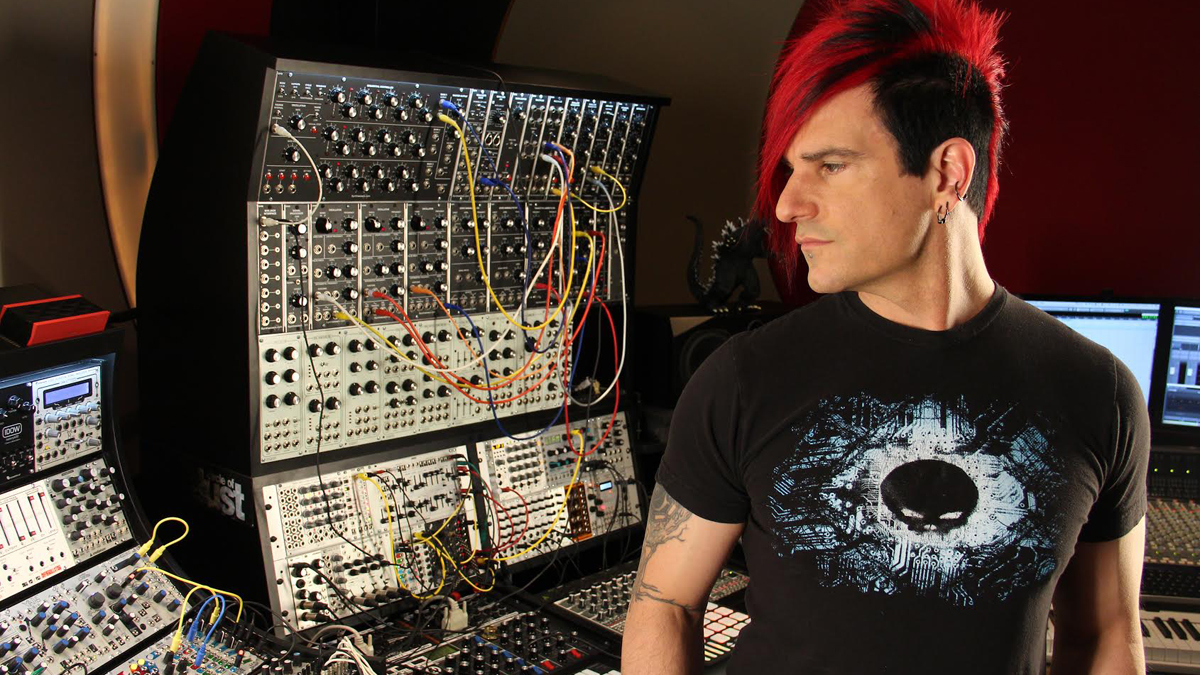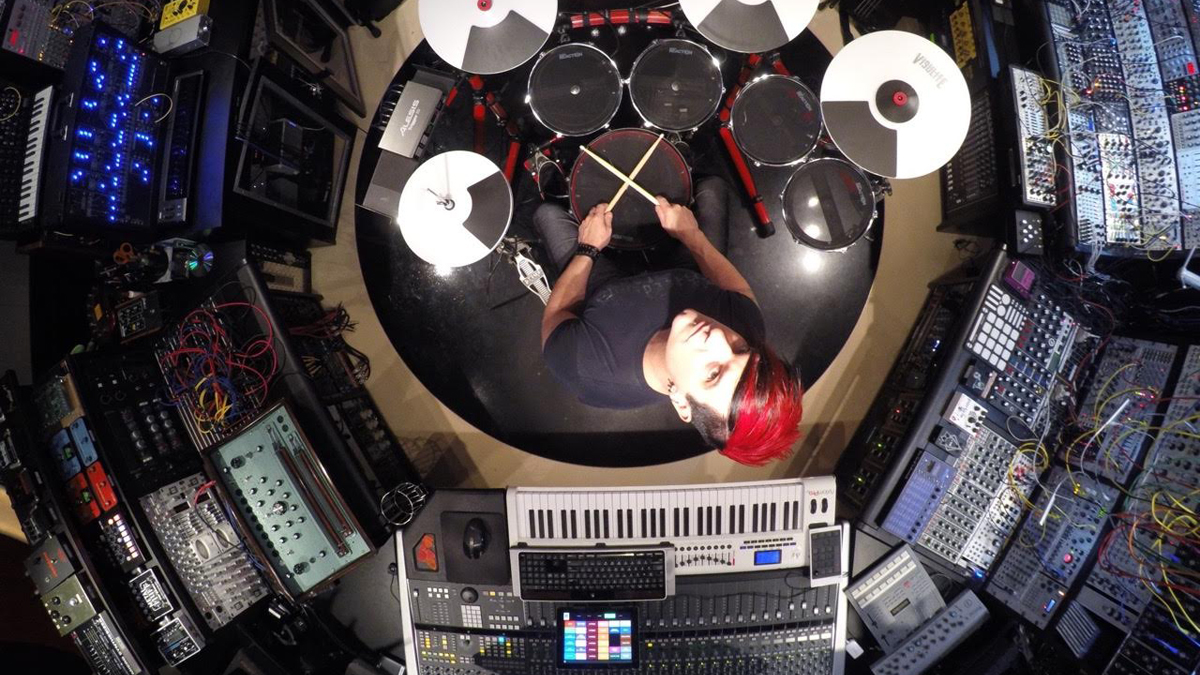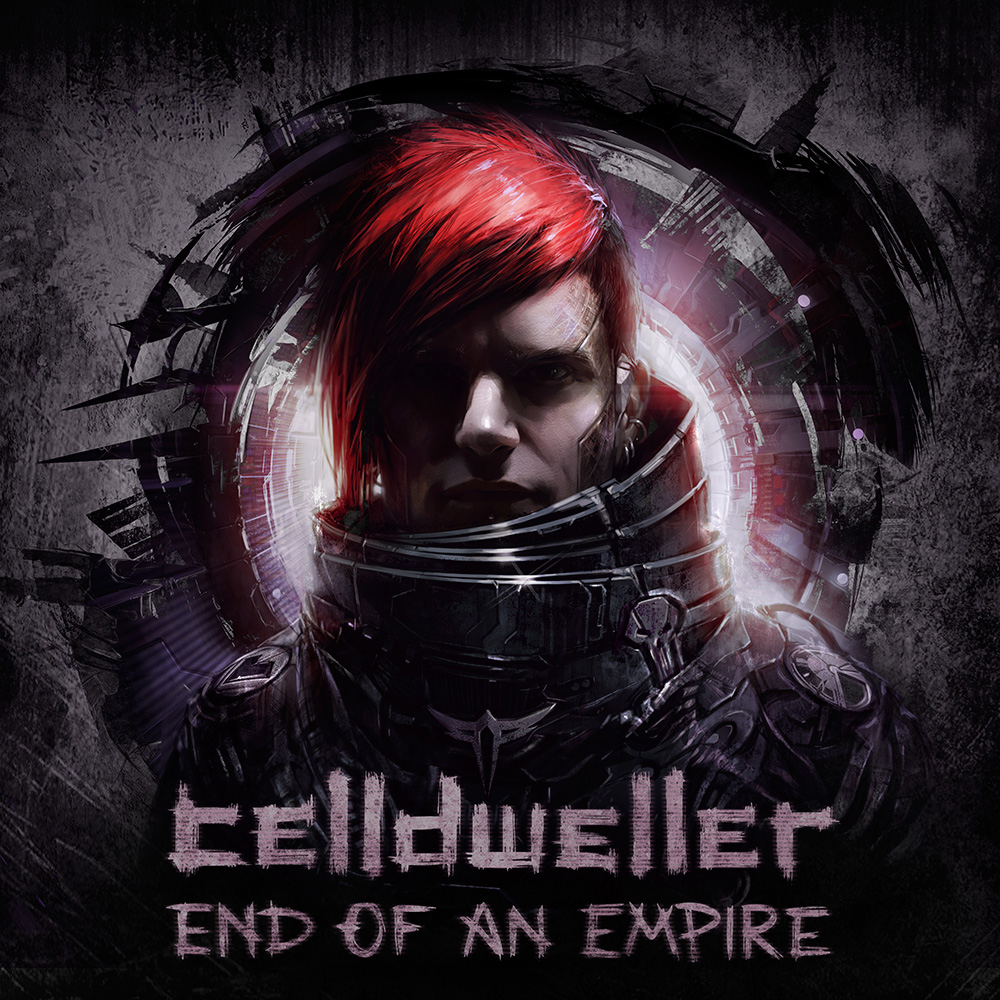Electro-rock futurist Celldweller talks modular
Celldweller star Klayton takes us deep into the sound design process behind new album, End of an Empire

Want all the hottest music and gear news, reviews, deals, features and more, direct to your inbox? Sign up here.
You are now subscribed
Your newsletter sign-up was successful
Few artists have amalgamated the power of rock with modern digital soundscapes as powerfully and enthusiastically as Detroit-based multi-instrumentalist Celldweller, whose studio albums are complemented by multiple entries into the world of soundtrack, TV and video gaming.
New album End of an Empire goes one step further, as chaptered releases combine with visual storyboards in the form of a 40-page comic book. Meanwhile, Celldweller's love of technology was further broadened by fusing analogue modular synthesis with his unremitting passion for digital sound design.
Were your influences industrial, electronic or rock bands?
"I was really into Slayer and Anthrax, but then I heard industrial music for the first time, bands like Skinny Puppy, Front 242 and Front Line Assembly - Caustic Grip was one of my favourite albums, and later they did Millennium, which mixed a lot of guitar and electronics.
"Those bands revolutionised my world and I realised that synths, electronics and samples could be just as heavy as guitar, bass and drums, which by themselves really bored me. When I discovered I could do it all myself, without having to worry about other band members or opinions, I never looked back."
"I would rather take something that sounds great and destroy it versus having something that doesn't sound great and spend a lot of time just trying to make it sound passable."
What gear did you first use to start making music?
"I was buying very little because I was very broke, so I begged, borrowed and stole, mostly through the generosity of my parents. I had a Mac Classic with 1MB of RAM and 40MB hard drive space, and a four-track.
Want all the hottest music and gear news, reviews, deals, features and more, direct to your inbox? Sign up here.
"I didn't get any money from my first record deal, but I told them if they wanted me to make an album I needed a sampler, so they bought me an Ensoniq EPS 16+, which is a mono sampler with 2MB of memory. My first three full length albums were made on those three pieces of gear, and a Roland D20."
Did using rudimentary gear give you a better appreciation of sound design?
"Well, I didn't understand production and made a lot of mistakes. What it did do though was teach me that having a little bit of gear often makes you a little more creative than when you have a lot of gear and don't actually know what to grab first.
"I only had one sampler and I knew that thing inside out, so it really did inspire creativity in different ways. Now I have so much gear I could pretty much do anything, and sometimes you get paralysed by that."
What's the concept behind the new album End of an Empire?
"Well, I'm a big sci-fi guy, and I've never been content with just releasing music, I've always had to tie visuals or some sort of story along with my albums, whether it's in the lyrics, through the art or music videos. So this is probably the most ambitious version of that because I released the album two songs at a time and did four chapters.
"Then I wrote a few more songs and put them all together to make the final album. Every time I released a chapter there was a new character in the artwork, and the lyrics would relate to one of the four empires: time, love, dreams and death.
"End of an Empire is such an epic idea, although I wasn't thinking in a historic way. Time is an empire, what happens what it ends? When love ends, how does it relate to us as humans? Dreams are the deepest desires of your heart, but what happened when your dreams die? And death is the final one.
"It's very symbolic, but I'm also releasing a 40-page comic book with all of these characters in one universe, so you can get a sense of what the story is across the whole album. And of course, the music and lyrics are completely standalone as well."
Your studio looks incredibly impressive, what sits at the heart of it?
"I have a trash can Mac running Cubase 8. I was a long time Pro Tools user and lived under that somewhat tyrannical regime for a while, but grew so tired of the politics within the whole Avid system I had to get out.
"All the hardware runs through an SSL AWS900+ console, so I have a nice, warm analogue board that I love. The master bus compressor sounds great and the EQs are excellent. I'm surrounded by outboard gear, lots of synths and multiple racks of modular gear - if anyone's interested, a quick Google search will find loads of pictures and videos of that stuff.
"That was one of the biggest differences on End of an Empire, almost all of the sound design was done through analogue modular synths - I think that changed the sound of my album and made it stand apart from a lot of what I've done before."

Are you using mostly Eurorack modular gear?
"It's mostly Eurorack, but I have a classic Moog Voyager and a Synthesisers.com set up that emulates the old Moog 5U modular system. Then I have things like the TTSH (Two Thousand Six Hundred), which is an ARP 2600 replica, an original Roland System 100M - I love the way that thing sounds, a Roland Juno-106, a Juno-160 and a couple of Prophet 600s. I also have a Buchla set up, and a Swarmatron, which I use a fair amount as well, so I can kind of do anything I want."
I guess you are you moving increasingly towards analogue-sounding productions?
"I think that the nature of something that is modular is much more unpredictable and I get results out of it that I can only emulate in the digital world. There's the sound too of course; there is a world of difference between the warmth and thickness of a true analogue oscillator over digital emulation.
"Like everyone else I was sceptical and, let's be honest, it's much easier to do things in the box that are easily recallable. With modular, if you make a sound, don't record it and pull one patch cable you're kind of hosed because you're never going to hear that sound again."
So how do you use modular systems in tandem with digital technology?
"I just record and record and record audio - at that point I'm committed to whatever that audio is and move on from there. But I also enjoy the tactile approach - the ability to touch a knob or twist a filter cut-off and have it affect your sound compared to holding a mouse and clicking on a gooey is quite a different feel and sound.
"We consume and are consumed by things that are new, and then after a while you go, okay, everyone's doing this I need something different. Why is there a huge comeback in vinyl? I think it's cos people are burnt on the idea of an MP3 being like vapour; it's in the cloud and people want something a little more physical. It feels real baby, and keeps you grounded to the fact that you're a human being and alive on earth."
What about sound quality? Do you think electronic music has suffered through digital recording?
"Absolutely, and I don't necessarily mean that in a negative way. Suffered is a strong word, but it's definitely changed, and whether that's for the better or worse is up to the individual. Digital often sounds digital, you can tell what it is and with music like EDM you want those digital sounds that cut through the mix. But I'm still inspired by albums that were made in the 70s and 80s, because they still sound great, even today."
Once in the DAW, do you do a lot of sound manipulation?
"I would rather take something that sounds great and destroy it versus having something that doesn't sound great and spend a lot of time just trying to make it sound passable. I've spent a lot of years doing that, because I didn't know what I was doing and didn't have great ears, so I was often 'polishing turds' as they say in America."
"I only had one sampler and I knew that thing inside out, so it really did inspire creativity in different ways. Now I have so much gear I could pretty much do anything, and sometimes you get paralysed by that."
On the digital side, what are your favourite plugins?
"FabFilter EQs, in fact the whole FabFilter suite sounds incredible - there's not a session that doesn't have a ton of Fab Filter Pro-Q2s and Simplons on it. Soundtoys also makes great sounding plugins that can really destroy or sweeten your sound, and they're all over my productions."
I understand you're developing your own software?
"Although it's not a software platform, I'm almost done developing my next instrument called Solaris, which has got over 2,000 samples that I made personally using all the analogue gear in my studio. It's a creative environment where you can load up sounds, mash a bunch of keys and it will randomly select between samples at whatever grid size you want.
"There's a step sequencer, delay sends, filter cut-off and envelope times for amplitude, so you can take all the cool sounds that I've already made and make new ones that nobody else has. That should be out next year."

The new Celldweller album 'End of an Empire' is out now on FiXT. For more information you can check out Celdweller's Facebook, Twitter, YouTube and Soundcloud pages.

